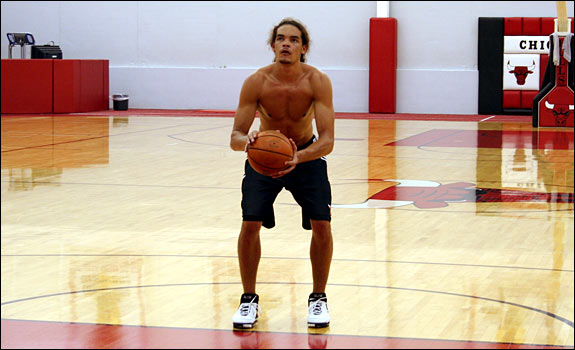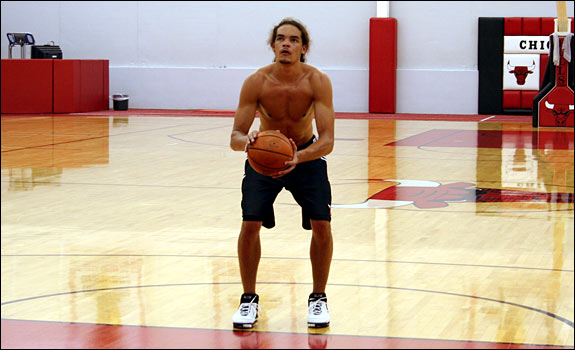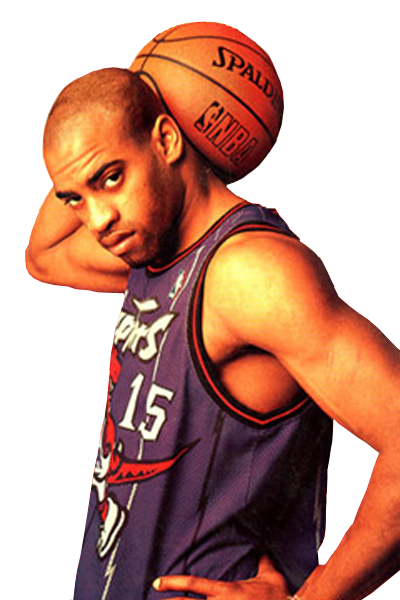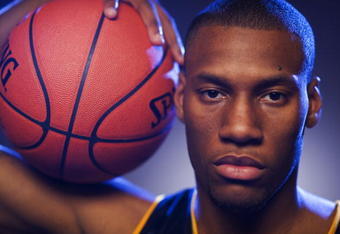Joakim Noah Needs Some Love
December 8, 2010 Leave a comment
“If you hate a person, you hate something in him that is part of yourself. What isn’t part of ourselves doesn’t disturb us.” – Hermann Hesse
We live in an era where having more than someone else automatically makes you a better person. But is that really true? We’re all equal parts. One way or another every person in the world is related in some way, so why all of the hatred? Why all of the negativity?
If you’re searching for the answer, Joakim Noah might be the person to talk to.
The son of both a peripatetic, famous father and an artistic mother, Noah was born in New York City before being raised in a bourgeois neighborhood in France, eventually moving back to Manhattan for his formative years. The Big Apple would always be home; it seemed like the perfect place for Noah to blend his outspoken personality in with a city full of unique people. Or so he thought. He was labeled a troublemaker in high school – he was kicked out of United Nations International School when he was 15 – and people would always stare or speak negatively about him and his family. But he never paid attention.
Because all Noah does is play basketball.
On the court, Noah is relentless and passionate. Many find him annoying, but he’s just doing his job, taking the other player out of his game. During his time in Gainesville, where he won back-to-back national titles with the Gators, Jo was arguably the most hated player in college basketball. They hated that he was a lanky seven-footer, that his hair flopped up and down every time he ran up the court. They hated that he would clap his hands after a block, that he pounded his chest knowing no one could touch him. They hated that he was a winner.
Fans knew he was good, but they chose not to believe it. They were too focused on his appearance rather than his overall talent. So while he continued to improve by outworking everyone, the boos got louder.
But that’s life. We will always hate on success. Noah didn’t ask for this, but who really does? No one truly wants to be hated by the world. Even Jo doesn’t know why.
“Some people like me. Some people really hate me,” Noah once told ESPNChicago.com’s Jon Greenberg. “It’s been like that since I was a little kid. I don’t really know what it is, if it’s the hair or just the way I am. I just learned to live with it.”
After becoming a lottery pick in 2007, Noah struggled in his first two seasons with the Chicago Bulls. He didn’t listen and clashed with teammates and coaches while playing a part in the firing of head coach Scott Skiles. Jo wasn’t used to losing and was a cocky rookie who played with selfish, uncoachable teammates. He was no longer the “big man on campus.” But something clicked last season. Jo sought advice from his former college coach Billy Donovan, and he found a friend in Derrick Rose who allowed him to mature. Just like that, he went from averaging a measly 6.7 points to last season’s double-double: 10.7 points and 11.0 rebounds. He also had his first taste of the playoffs.
His performance had finally caught up with his intensity.
The entire city of Chicago had finally fallen in love with what Noah was drafted for: hard work. He was booed in his own arena as a rookie, and during this summer’s free agency craze, there were talks of him being traded for Carmelo Anthony, causing quite a few Chicagoans to again evaluate how truly valuable Jo is to the team. In October, he signed a five-year, $60-million extension that will keep him in Chicago until the 2015-16 season.
So far this season he’s averaging career highs in minutes (38.4), points (15.4) and rebounds (12.2). He’s also improved his unorthodox jump shot, which he calls “unusual” and “artistic.” He’s connecting on 44.7 percent of his shots from 10 feet, 66.7 percent from 10-15 feet and 41.0 percent from 16-23 feet, all major improvements.
At 25 years old, many would say that Noah has reached his peak. Still, he was raw coming out of college, and should have room for improvement. And while his unabated emotion is no longer considered “showboating” to those around the League, it has become the fuel that will keep the fire burning in Chicago. Fans shouldn’t hate him even though he enjoys taking that role. At the end of the day, he’s the guy who just dropped a double-double on the opposing team and came out with the win.
The question that we should ask ourselves is: are we hating Noah strictly because of his looks, or because we aren’t comfortable within our own skin just yet? Self-empowerment comes through positive thought and many of us carry a notion that other people are more emotionally solid than we are. But is that really true? We all wear disguises and fool ourselves into believing that the disguise, rather than the confidence it brings, is what attracts others to us. So why continue to hate on someone who isn’t afraid of being what he’s supposed to be?
Noah has one of the biggest hearts in the NBA. Why? Because he doesn’t listen to the things that would normally wear us down. Haters will continue to hate. It’s their job, trying to keep him from succeeding.
It’s too late now.
Andrew Macaluso is a contributing writer for Endangered Hoops. You can find more of his work at DimeMag.com, SLAMonline.com and as well as his blog, News From the Hardwood. You can follow Andrew on Twitter at @_andymac



